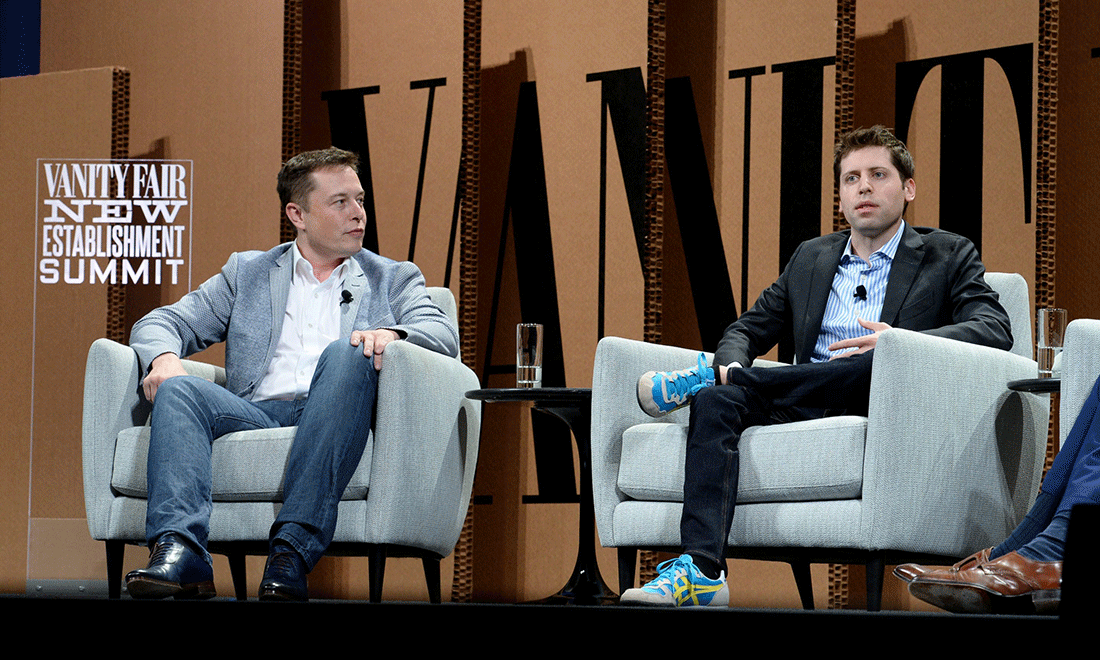
虽然埃隆·马斯克最近成立了一家人工智能初创公司,与OpenAI竞争,但在不久之前,他还联合创立了这家如今声名显赫的人工智能聊天机器人制造商(ChatGPT和GPT-4),并为OpenAI给予重大帮助。
OpenAI的首席执行官萨姆·奥尔特曼于两周前在参加《In Good Company》播客节目时描述了马斯克早期所扮演的角色。
奥尔特曼告诉主持人尼古拉·坦根:“毋庸置疑,埃隆是人才磁铁,还擅长哗众取宠,而且除此之外,他还神通广大,这在早期对我们大有助益。”
他没有给出具体例子来解释马斯克如何神通广大,但风险投资家马克·安德森在最近概述了马斯克的心理特征,这些特征让他成为“无法低调行事”的企业家的“最佳典范”。
今年,马斯克对OpenAI的发展方向表示反感,并于7月创办了xAI,他表示xAI“肯定会与奥尔特曼的公司进行竞争”。xAI的远大目标是“理解宇宙的本质”,这是马斯克的典型风格。为此,他从谷歌(Google)、DeepMind、微软(Microsoft)和特斯拉(Tesla)引进了顶尖的人工智能人才。
马斯克于2018年离开了OpenAI董事会。据美国Semafor网站称,他曾经提出领导该组织,但在遭到拒绝后离开了。
马斯克如今的不满之一是,他在2015年联合创立了OpenAI,其初衷是打造一家非营利性组织,但OpenAI在2019年转为“有限盈利”架构——同年,OpenAI获得了微软10亿美元的投资,随后又获得了数十亿美元的投资。
越来越明显的是,今年早些时候,马斯克对OpenAI的现状非常不满,因为该公司在推出ChatGPT后估值飙升,人工智能聊天机器人成为史上用户增长速度最快的产品之一。
今年2月,他在推特(Twitter)上写道:“创建初始,Open AI是一家非营利性的开源(这也是我将其命名为‘Open’AI的原因)机构,旨在制衡谷歌,但现在它变成了实际上由微软控制的闭源、追求利益最大化的公司。”
虽然奥尔特曼承认OpenAI在很多方面走了一条非常规的道路,但他对与微软合作的这一表述提出了质疑,微软的首席执行官萨蒂亚·纳德拉也提出了质疑。但马斯克在5月接受美国消费者新闻与商业频道(CNBC)采访时表示:“我确实担心,微软实际上可能比OpenAI的领导团队意识到的更有控制权。”
今年3月,他还抱怨说,在他向OpenAI捐赠了数百万美元之后,该机构从非营利模式转变为营利模式。
他在推特上写道:“我仍然很困惑,我捐赠了1亿美元的非营利性组织是如何变成市值300亿美元的营利性组织的。如果这是合法的,为什么大家都不效仿呢?”后来,人们对马斯克捐赠的实际金额产生了怀疑,但很清楚的是,他确实向当时的非营利性组织捐赠了数百万美元。
奥尔特曼对马斯克的评价褒贬不一。今年5月,奥尔特曼在英国伦敦的一次演讲里表示,“从埃隆身上学到什么是能够完成的”,“这是非常有价值的”。
但奥尔特曼在今年3月接受《On With Kara Swisher》播客节目的采访时说:“不管你想怎么谈论他,我想说他就是个混蛋——我不想拥有他的风格。”(财富中文网)
译者:中慧言-王芳
虽然埃隆·马斯克最近成立了一家人工智能初创公司,与OpenAI竞争,但在不久之前,他还联合创立了这家如今声名显赫的人工智能聊天机器人制造商(ChatGPT和GPT-4),并为OpenAI给予重大帮助。
OpenAI的首席执行官萨姆·奥尔特曼于两周前在参加《In Good Company》播客节目时描述了马斯克早期所扮演的角色。
奥尔特曼告诉主持人尼古拉·坦根:“毋庸置疑,埃隆是人才磁铁,还擅长哗众取宠,而且除此之外,他还神通广大,这在早期对我们大有助益。”
他没有给出具体例子来解释马斯克如何神通广大,但风险投资家马克·安德森在最近概述了马斯克的心理特征,这些特征让他成为“无法低调行事”的企业家的“最佳典范”。
今年,马斯克对OpenAI的发展方向表示反感,并于7月创办了xAI,他表示xAI“肯定会与奥尔特曼的公司进行竞争”。xAI的远大目标是“理解宇宙的本质”,这是马斯克的典型风格。为此,他从谷歌(Google)、DeepMind、微软(Microsoft)和特斯拉(Tesla)引进了顶尖的人工智能人才。
马斯克于2018年离开了OpenAI董事会。据美国Semafor网站称,他曾经提出领导该组织,但在遭到拒绝后离开了。
马斯克如今的不满之一是,他在2015年联合创立了OpenAI,其初衷是打造一家非营利性组织,但OpenAI在2019年转为“有限盈利”架构——同年,OpenAI获得了微软10亿美元的投资,随后又获得了数十亿美元的投资。
越来越明显的是,今年早些时候,马斯克对OpenAI的现状非常不满,因为该公司在推出ChatGPT后估值飙升,人工智能聊天机器人成为史上用户增长速度最快的产品之一。
今年2月,他在推特(Twitter)上写道:“创建初始,Open AI是一家非营利性的开源(这也是我将其命名为‘Open’AI的原因)机构,旨在制衡谷歌,但现在它变成了实际上由微软控制的闭源、追求利益最大化的公司。”
虽然奥尔特曼承认OpenAI在很多方面走了一条非常规的道路,但他对与微软合作的这一表述提出了质疑,微软的首席执行官萨蒂亚·纳德拉也提出了质疑。但马斯克在5月接受美国消费者新闻与商业频道(CNBC)采访时表示:“我确实担心,微软实际上可能比OpenAI的领导团队意识到的更有控制权。”
今年3月,他还抱怨说,在他向OpenAI捐赠了数百万美元之后,该机构从非营利模式转变为营利模式。
他在推特上写道:“我仍然很困惑,我捐赠了1亿美元的非营利性组织是如何变成市值300亿美元的营利性组织的。如果这是合法的,为什么大家都不效仿呢?”后来,人们对马斯克捐赠的实际金额产生了怀疑,但很清楚的是,他确实向当时的非营利性组织捐赠了数百万美元。
奥尔特曼对马斯克的评价褒贬不一。今年5月,奥尔特曼在英国伦敦的一次演讲里表示,“从埃隆身上学到什么是能够完成的”,“这是非常有价值的”。
但奥尔特曼在今年3月接受《On With Kara Swisher》播客节目的采访时说:“不管你想怎么谈论他,我想说他就是个混蛋——我不想拥有他的风格。”(财富中文网)
译者:中慧言-王芳
While Elon Musk recently launched an A.I. startup to compete against OpenAI, not that long ago he cofounded the now-famous company—maker of A.I. chatbots ChatGPT and GPT-4—and helped it in significant ways.
OpenAI CEO Sam Altman described Musk’s early role during an appearance on the In Good Company podcast at two weeks ago.
“Elon was definitely a talent magnet and attention magnet, for sure, and also just like has some real superpowers that were super helpful to us in those early days, aside from all of those things,” Altman told host Nicolai Tangen.
He didn’t give examples of those “superpowers,” but venture capitalist Marc Andreessen recently outlined the psychological traits that make Musk “the paramount example” of an entrepreneur who “can’t turn it off.”
This year, Musk has expressed disgust with the direction taken by OpenAI, and in July he launched xAI, which he said is “definitely in competition” with Altman’s company. xAI’s loftier goal, in typical Musk style, is to “understand the true nature of the universe.” To that end he’s brought in top A.I. talent from Google, DeepMind, Microsoft, and his own Tesla.
Musk left OpenAI’s board of directors in 2018. He’d offered to lead the organization, but walked away from it after being rebuffed, according to Semafor.
One of his beefs today is that he cofounded OpenAI as a nonprofit in 2015, but then it switched to a “capped profit” model in 2019—the same year it received a $1 billion investment from Microsoft, with more billions to follow.
Musk’s unhappiness with OpenAI became increasingly clear earlier this year as the company’s valuation soared following the launch of ChatGPT, with the A.I. chatbot becoming one of the most quickly adopted products of all time.
He tweeted in February: “OpenAI was created as an open source (which is why I named it “Open” AI), non-profit company to serve as a counterweight to Google, but now it has become a closed source, maximum-profit company effectively controlled by Microsoft.”
Altman, while admitting OpenAI has taken an unconventional path in many ways, contests this characterization of the partnership with Microsoft, as does Microsoft CEO Satya Nadella. But Musk, in a May interview with CNBC, said, “I do worry that Microsoft actually may be more in control than say the leadership team at OpenAI realizes.”
He also complained in March about the fact that OpenAI’s change from a nonprofit model was made after he had donated millions to it.
“I’m still confused as to how a non-profit to which I donated ~$100M somehow became a $30B market cap for-profit,” he tweeted. “If this is legal, why doesn’t everyone do it?” Doubts later arose about the actual amount he gave, but it seems clear that he did donate millions of dollars to the then-nonprofit.
Altman’s remarks on Musk have been mixed. In May, Altman said during a speech in London that “learning from Elon about what is just, like, possible to do” had been “super valuable.”
But he told the On With Kara Swisher podcast in March, “I mean, he’s a jerk, whatever else you want to say about him—he has a style that is not a style that I’d want to have for myself.”






